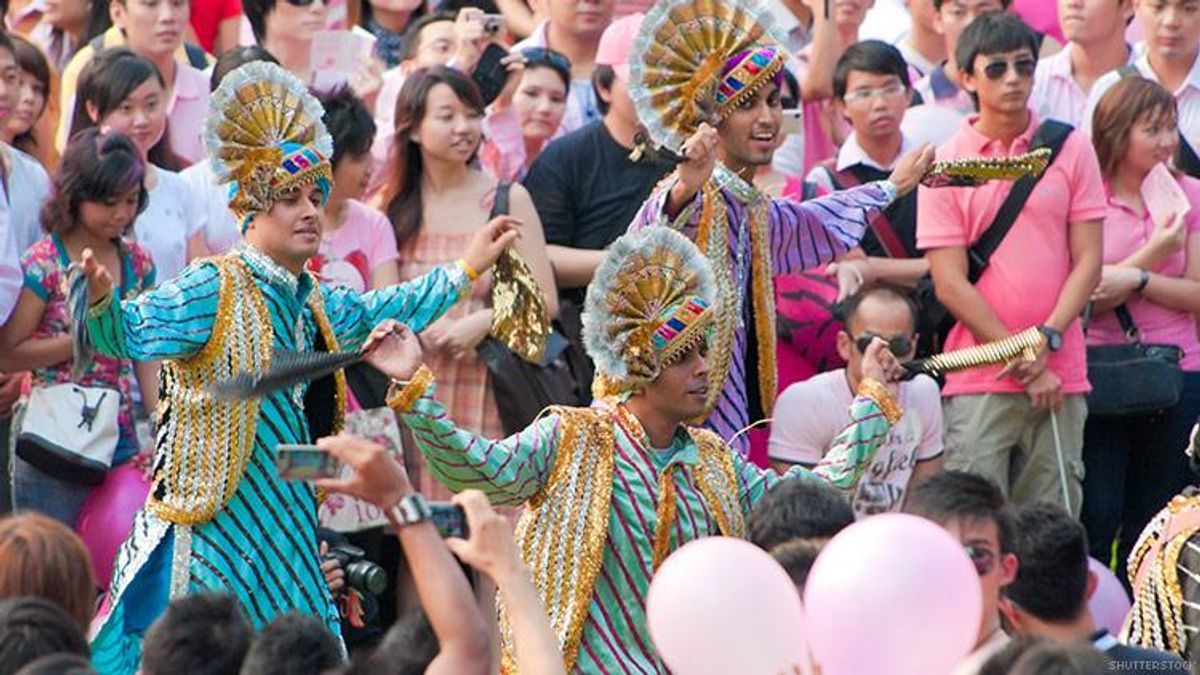World
Singapore's 'Crazy Rich Asians' Push to Overturn Anti-LGBTQ Laws

In real life, extremely wealthy Singaporeans are fighting to decriminalize gay sex.
Ariel Sobel
October 03 2018 4:53 PM EST
May 31 2023 8:10 PM EST
By continuing to use our site, you agree to our Private Policy and Terms of Use.

In real life, extremely wealthy Singaporeans are fighting to decriminalize gay sex.
The most elite members of Singapore's business, political, and legal sectors are using their surplus dollars to back efforts to overturn bans on gay sex.
The likes of former ambassador to the U.S. Tommy Koh and former attorney general Walter Woon are at the center of the efforts to promote LGBTQ equality, reports Bloomberg. Major business moguls are also backing the cause.
Ho Kwon Ping, who is the founder and executive chairman of Banyan Tree Holdings Ltd., Hsieh Fu Hua, who serves on the board of the National University of Singapore, and Shangri-La Hotel Ltd executive chairman Kay Kuok are all joining the fight to decriminalize homosexuality.
"377A is a bad and unjust law," Koh announced, referring to the 1938 British colonial law that made gay sex illegal. "In my view, it is also a violation of our constitution."
Experts say that repealing 377A could boost Singapore's economy, which is already worth $324 billion. By making the country more suitable for LGBTQ talent, legalizing gay sex could mean brighter minds to recruit for the nation's 37,400 international companies.
According to the University of California, Los Angeles School of Law, LGBTQ legal equality can lead to booming business. Nations enjoy a gross domestic product per capita increase of around $2,065 for every new legal opportunity offered to LGBTQ people. LGBTQ travel is also a lucrative business; 35 million queer travelers spend $200 billion on global wanderlust a year.
"Destinations that support equality for their citizens are more likely to see increased numbers of LGBTQ travelers who prefer to spend their dollars in places that make them feel safe and welcome," International Gay & Lesbian Travel Association CEO John Tanzella told Bloomberg via email.
However, surveys show that most Singaporeans still support the ban on gay sex, and politicians are unlikely to respond to the push for inclusivity.
As rich as these moguls are, they lack the influence of Singapore's Christian community. The National Council of Churches, the Alliance of the Pentecostal-Charismatic Churches, and the Roman Catholic Archdiocese have strongly opposed any effort to decriminalize gay sex.
"Politicians are afraid of the public reaction," Jean Chong told Bloomberg. As the program field director of Outright Action International, she also co-founded Sayoni, an organization that unites queer women in Singapore. "This is still a very conservative country."
LGBTQ advocates hope that India's repeal of a 157-year-old ban on gay sex will encourage the conservative nation to follow suit.
"There is no better time for equality than the present," Johnson Ong said. The 43-year-old DJ filled a legal challenge against 377A four days after news came that gay sex was legal in India. "India's recent ruling and Professor Tommy Koh's statements have energized me."
"While Singaporean courts can consider the reasoning of Indian judges, they are not obliged to follow their approach," Lynette J. Chua, who teaches law at the National University of Singapore wrote to Bloomberg in an email. "In various public statements, key politicians have pointed to public opinion and taken the view that the majority still disapproved of homosexuality or wanted to keep section 377A."
Regardless of the potential business dollars lost to homophobic laws, the real cost is human.
"Section 377A remains a constant reminder to me that I am a lesser citizen, even when not being enforced," DJ Ong explained. "To have to live with this constantly takes a psychological toll on you."